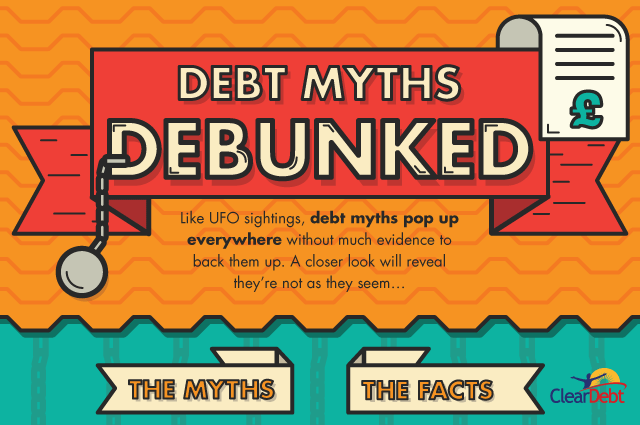There are many debt myths and old wives’ tales when it comes to the consequences of being in debt. Some may have an element of truth to them, others are completely inaccurate. Our infographic will help you to establish fact from fiction.
Debt myths debunked: Repossession and bailiffs
Believe it or not, repossession is a last resort for mortgage lenders. They have to abide by a code of conduct. Rather than burying your head in the sand, if you approach them and explain your difficulties they will often work with you to try to find a solution, but bailiffs can call for other reasons too…
There are three golden rules when it comes to dealing with bailiffs.
They must issue you with an enforcement notice before they can visit your property to collect any debts. Enforcement officers and bailiffs are not permitted to enter your premises, so don’t be intimidated to let them do so. Never sign anything!
Your credit rating can be repaired and is not affected by those you live with
Yes, contrary to popular belief, having been in debt at some time will not affect you being able to obtain credit for the rest of your life. IVA and bankruptcy stays on your credit file for 6 years. Once your defaults have been removed from your credit file you’ll be in a position to start building up a positive credit history again.
Your credit history will not have any impact on the people you live with, nor will theirs affect you. Lenders no longer check the credit files of those living at your address with you. However, if you have a joint account, lenders will still check this.
Taking out a joint account with somebody with poor credit can have a negative effect on your credit score, even if you have an excellent score, so always bear this in mind when opening joint accounts.
Only half of the debt is mine?
Never be fooled into thinking that by taking out a joint credit account you are only responsible for half of the balance. If the other person defaults on their payment towards the debt, your lender can still chase you for the full amount. This is called joint and several liability.
Always carefully consider everything before taking out a financial commitment with anyone else. Are they as dedicated as you to paying the debt back? Are they in stable employment and can they afford to keep up with the repayments?
If something goes wrong would you be happy to shoulder all of the debt?
